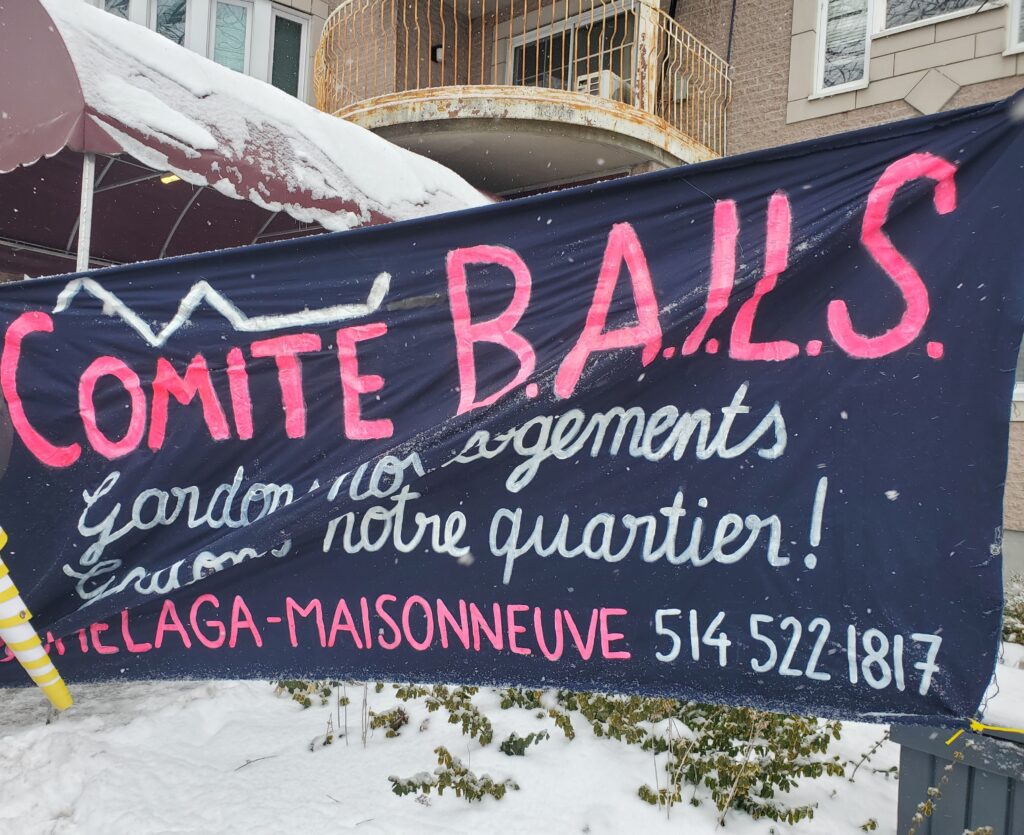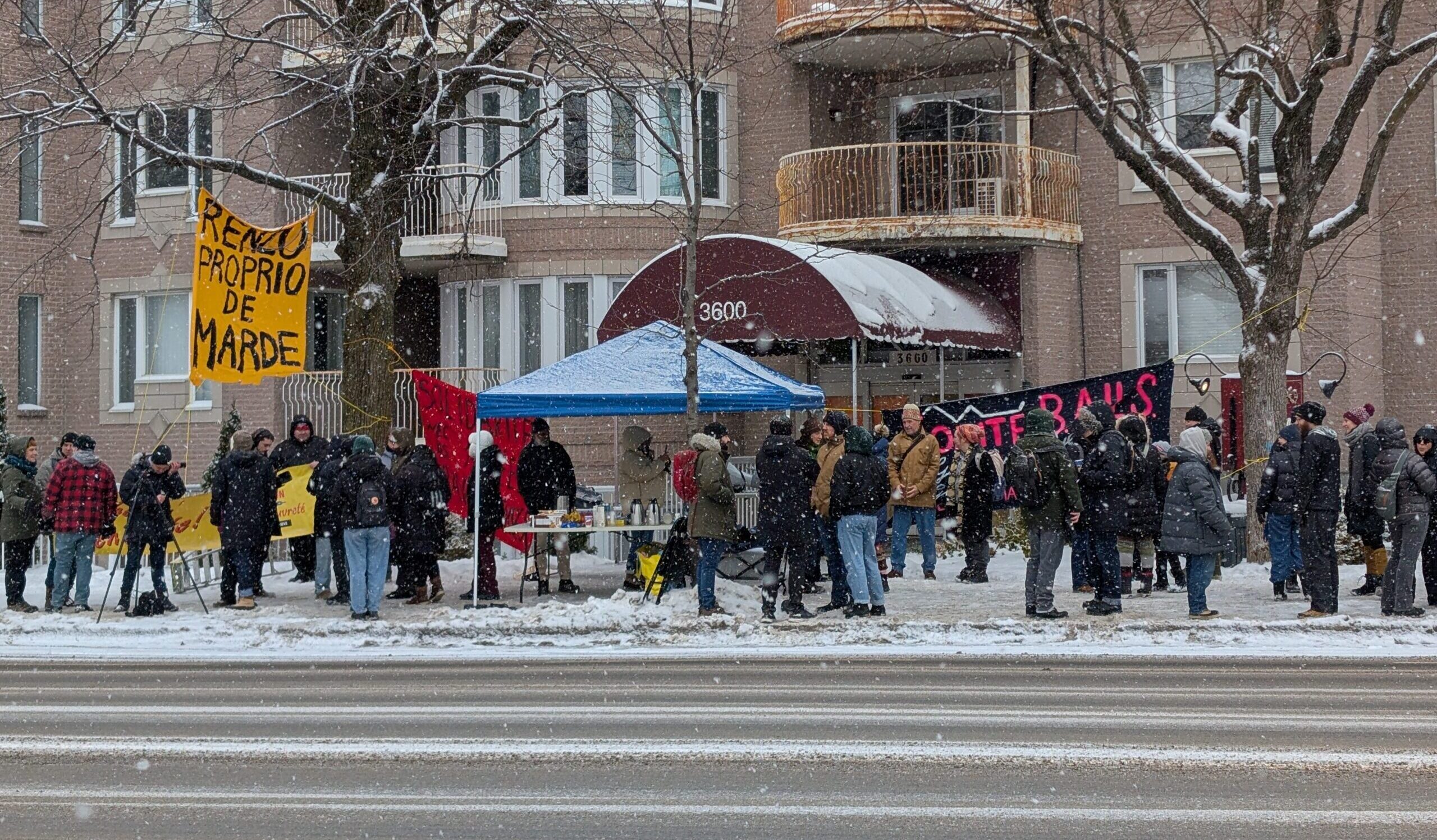As a privately owned seniors’ residence in Montreal illegally evicts all of its residents, a coalition of tenant advocacy organizations and community members gathered on Thursday to denounce the abuses. Activists and residents reported appalling conditions in the residence and harassment of residents. They also denounced the province and the city for collaborating with the landlord instead of defending the tenants.
On November 1, 2024, the media announced that the 120-unit Manoir Louisiane in Hochelaga would close in July 2025. Local housing groups mobilized to meet with tenants and inform them of their rights, but police turned the organizers away from the building.
After effectively blocking contact between tenants and housing committees, the landlord, Rosaria Renzo, turned to a strategy of harassment and service cuts. “I was called an old bitch, a slut, all the words,” said 83-year-old resident Pierrette Cyr. “They play with your neurons. They want to drive you crazy, really […] and people are really having psychiatric crises.”
Residents reported cuts to food, cleaning, heating, and building maintenance services, all of which they were still paying for. The service cuts added to already-distressing living conditions that included longstanding untreated bedbug infestations. Uninformed of their rights and unable to tolerate the abuse and negligence any further, most of the tenants left the building as quickly as they were able.
On January 7, Renzo announced to the three remaining residents that she would close the building by locking the doors from the inside if they did not leave immediately, despite the original announcement giving them until July to find new housing.
The city and province pass the buck
The housing and community groups that organized Thursday’s event say that the city and the province bear significant responsibility for the situation at the Manoir Louisiane. They called on the province’s integrated health and social services network for the area, the CIUSSS de l’Est-de-l’Île-de-Montréal, to intervene in such cases to protect residents and inform them of their rights.
“Firstly, the CIUSSS should have done more to make sure that this building was actually safe and habitable and dignified for the residents here while they were here,” said Valerie Campanelli, a housing organizer with La Table de Quartier Hochelaga–Maisonneuve.
“When they heard that the building was going to be closed because of the stopping of services, and they also were very much made aware of the issues that the community groups had with getting inside and giving quality legal information to the tenants, they did nothing. We believe that they worked complicitly with the landlord to get everyone out as fast as possible.”
Campanelli also pointed out the city’s obligation to enforce health, safety, and maintenance standards in all buildings. “They have the right to sanction the landlord. They can condemn the building,” she said.
“Despite pressure from community groups to act, they basically told us that actually, that rule doesn’t apply to [private seniors’ residences]. We have the CIUSSS telling us it’s the municipality’s responsibility to do that, and then we have the municipality telling us, ‘We can’t act.’”

Violations of the right to housing
Tenants in Quebec generally have a right to maintain their housing as long as they pay their rent and do not abuse their apartment or neighbours. However, a carve-out in the province’s recent eviction moratorium allows for eviction of residents from a private seniors’ home that will stop operating.
Still, any tenant served with an eviction notice has the right to refuse to leave. In such cases, the matter comes before the province’s housing tribunal. Moreover, low-income tenants who are at least 65 years old cannot be evicted from housing if they have been there for 10 years or more.
Where eviction is permitted, tenants are entitled to compensation of at least three months’ worth of rent, plus moving costs. “[The Manoir Louisiane tenants] have left without any compensation, and well before the legal deadline for a change of use,” remarked Manuel Johnson, one of the housing lawyers representing the tenants. “To be driven out of your home in the middle of a holiday season under the threat of intimidation, harassment and manipulation is not within the scope of the law.”
Visions of a better model
Many present at Thursday’s event criticized the public-private partnership in seniors’ homes and called for socially owned housing for the elderly.
“We have to ask ourselves whether we can continue to afford as a society to entrust the well-being of our seniors to the private sector, whose primary objective is this pursuit of profit,” said Johnson.
“Should we simply nationalize private seniors’ residences?” he asked the crowd, who responded with cheers and applause.
Valerie Campanelli agrees: “Private seniors’ residences are this kind of grotesque monster that combines the public and private interests that absolutely does not work at all,” she told The North Star. “Any time we asked any institution, public institution, to get involved, the response was basically, ‘Those are hard, and the application of laws and rules on those terms, they’re kind of complicated.’”
“These need to be public buildings,” she continued. “We need to push our governments to say that, you know, the health of the elderly is the responsibility of all and leaving it in the hands of private owners is never going to work. There will always be negligence and abuse if we leave it up to profit making versus health.”

